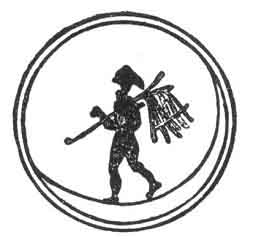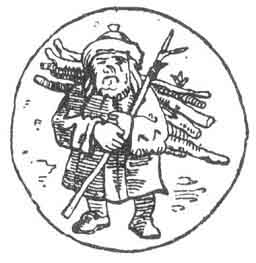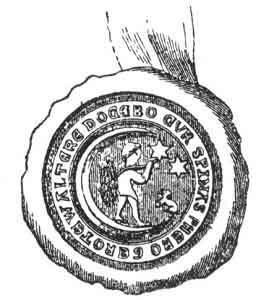
Here for the present we part company with the man in the moon as material for amusement, that we may track him through the mythic maze, where, in well-nigh every language, he has left some traces of his existence. As there is a side of the moon which we have never seen, and according to Laplace never shall see, there is also an aspect of the matter in hand that remains to be traversed, if we would circumambulate its entire extent. Our subject must now be viewed in the magic mirror of mythology. The antiquarian Ritson shall state the question to be brought before our honourable house of inquiry. He denominates the man in the moon "an imaginary being, the subject of perhaps one of the most ancient, as well as one of the most popular, superstitions of the world." 8 And as we must explore the vestiges of antiquity, Asiatic and European, African and American, and even Polynesian, we bespeak patient forbearance and attention. One little particular we may partly clear up at once, though it will meet us again in another connection. It will serve as a sidelight to our legendary scenes. In English, French, Italian, Latin, and Greek, the moon is feminine; but in all the Teutonic tongues the moon is masculine. Which of the twain is its true gender? We go back to the Sanskrit for an answer. Professor Max Müller rightly says, "It is no longer denied that for throwing light on some of the darkest problems that have to be solved by the student of language, nothing is so useful as a critical study of Sanskrit." 9Here the word for the moon is mâs, which is masculine. Mark how even what Hamlet calls "words, words, words"
lend their weight and value to the adjustment of this great argument. The very moon is masculine, and, like Wordsworth's child, is "father of the man."
If a bisexous moon seem an anomaly, perhaps the suggestion of Jamieson will account for the hermaphrodism: "The moon, it has been said, was viewed as of the masculine gender in respect of the earth, whose husband he was supposed to be; but as a female in relation to the sun, as being his spouse." 10 Here, also, we find a clue to the origin of this myth. If modern science, discovering the moon's inferiority to the sun, call the former feminine, ancient nescience, supposing the sun to be inferior to the moon, called the latter masculine. The sun, incomparable in splendour, invariable in aspect and motion, to the unaided eye immaculate in surface, too dazzling to permit prolonged observation, and shining in the daytime, when the mind was occupied with the duties of pastoral, agricultural, or commercial life, was to the ancient simply an object of wonder as a glory, and of worship as a god. The moon, on the contrary, whose mildness of lustre enticed attention, whose phases were an embodiment of change, whose strange spots seemed shadowy pictures of things and beings terrestrial, whose appearance amid the darkness of night was so welcome, and who came to men susceptible, from the influences of quiet and gloom, of superstitious imaginings, from the very beginning grew into a familiar spirit of kindred form with their own, and though regarded as the subordinate and
wife of the sun, was reverenced as the superior and husband of the earth. With the transmission of this myth began its transmutation. From the moon being a man, it became a man's abode: with some it was the world whence human spirits came; with others it was the final home whither human spirits returned. Then it grew into a penal colony, to which egregious offenders were transported; or prison cage, in which, behind bars of light, miserable sinners were to be exposed to all eternity, as a warning to the excellent of the earth. One thing is certain, namely, that, during some phases, the moon's surface strikingly resembles a man's countenance. We usually represent the sun and the moon with the faces of men; and in the latter case the task is not difficult. Some would say that the moon is so drawn to reproduce some lunar deity: it would be more correct to say that the lunar deity was created through this human likeness. Sir Thomas Browne remarks, "The sun and moon are usually described with human faces: whether herein there be not a pagan imitation, and those visages at first implied Apollo and Diana, we may make some doubt." 11 Brand, in quoting Browne, adds, "Butler asks a shrewd question on this head, which I do not remember to have seen solved:--
Another factor in the formation of our moon-myth was the anthropomorphism which sees something manlike in everything, not only in the anthropoid apes, where we may find a resemblance more faithful than flattering, but also in the mountains and hills, rivers and seas of earth, and in the planets and constellations of heaven. Anthropomorphism was but a species of personification, which also metamorphosed the firmament into a menagerie of lions and bears, with a variety of birds, beasts, and fishes. Dr. Wagner writes: "The sun, moon, and stars, clouds and mists, storms and tempests, appeared to be higher powers, and took distinct forms in the imagination of man. As the phenomena of nature seemed to resemble animals either in outward form or in action, they were represented under the figure of animals." 13 Sir George W. Cox points out how phrases ascribing to things so named the actions or feelings of living beings, "would grow into stories which might afterwards be woven together, and so furnish the groundwork of what we call a legend or a romance. This will become plain, if we take the Greek sayings or myths about Endymion and Selênê. Here, besides these two names, we have the names Protogenia and Asterodia. But every Greek knew that Selênê was a name for the moon, which was also described as Asterodia because she has her path among the stars, and that Protogenia denoted the first or early born morning. Now Protogenia was the mother of Endymion, while Asterodia was his wife; and so far the
names were transparent. Had all the names remained so, no myth, in the strict sense of the word, could have sprung up; but as it so happened, the meaning of the name Endymion, as denoting the sun, when he is about to plunge or dive into the sea, had been forgotten, and thus Endymion became a beautiful youth with whom the moon fell in love, and whom she came to look upon as he lay in profound sleep in the cave of Latmos." 14 To this growth and transformation of myths we may return after awhile; meanwhile we will follow closely our man in the moon, who, among the Greeks, was the young Endymion, the beloved of Diana, who held the shepherd passionately in her embrace. This fable probably arose from Endymion's love of astronomy, a predilection common in ancient pastors. He was, no doubt, an ardent admirer of the moon; and soon it was reported that Selênê courted and caressed him in return. May such chaste enjoyment be ours also! We may remark, in passing, that classic tales are pure or impure, very much according to the taste of the reader. "To the jaundiced all things seem yellow," say the French; and Paul said, "To the pure all things are pure: but unto them that are defiled is nothing pure." According to Serapion, as quoted by Clemens Alexandrinus, the tradition was that the face which appears in the moon is the soul of a Sibyl. Plutarch, in his treatise, Of the Face appearing in the roundle of the Moone, cites the poet Agesinax as saying of that orb,
The story of the man in the moon as told in our British nurseries is supposed to be founded on Biblical fact. But though the Jews have a Talmudic tradition that Jacob is in the moon, and though they believe that his face is plainly visible, the Hebrew Scriptures make no mention of the myth. Yet to our fireside auditors it is related that a man was found by Moses gathering sticks on the Sabbath, and that for this crime he was transferred to the moon, there to remain till the end of all things. The passage cited in support of this tale is Numbers xv. 32-36. Upon referring to the sacred text, we certainly find a man gathering sticks upon the Sabbath day, and the congregation gathering stones for his merciless punishment, but we look in vain for any mention of the moon. Non est inventus. Of many an ancient story-teller we may say, as Sheridan said of Dundas, "the right honourable gentleman is indebted to his memory for his jests and to his imagination for his facts."
Mr. Proctor reminds us that "according to German nurses, the day was not the Sabbath, but Sunday. Their tale runs as follows: Ages ago there went one Sunday an old man into the woods to hew sticks. He
cut a faggot and slung it on a stout staff, cast it over his shoulder, and began to trudge home with his burthen. On his way he met a handsome man in Sunday suit, walking towards the church. The man stopped, and asked the faggot-bearer, 'Do you know that this is Sunday on earth, when all must rest from their labours?' 'Sunday on earth, or Monday in heaven, it's all one to me!' laughed the woodcutter. 'Then bear your bundle for ever!' answered the stranger. 'And as you value not Sunday on earth, yours shall
be a perpetual moon-day in heaven; you shall stand for eternity in the moon, a warning to all Sabbath-breakers.' Thereupon the stranger vanished, and the man was caught up with his staff and faggot into the moon, where he stands yet." 16
In Tobler's account the man was given the choice of burning in the sun, or of freezing in the moon; and preferring a lunar frost to a solar furnace, he is to be seen at full moon seated with his bundle of sticks on his back. If "the cold in clime are cold in blood," we may be thankful that we do not hibernate eternally
in the moon and in the nights of winter, when the cold north winds blow," we may look up through the casement and "pity the sorrows of this poor old man."
Mr. Baring-Gould finds that "in Schaumberg-lippe, the story goes, that a man and a woman stand in the moon: the man because he strewed brambles and thorns on the church path, so as to hinder people from attending mass on Sunday morning; the woman because she made butter on that day. The man carries his bundle of thorns, the woman her butter tub. A similar tale is told in Swabia and in Marken. Fischart says that there 'is to be seen in the moon a mannikin who stole wood'; and Prætorius, in his description of the world, that 'superstitious people assert that the black flecks in the moon are a man who gathered wood on a Sabbath, and is therefore turned into stone.'" 17
The North Frisians, among the most ancient and pure of all the German tribes, tell the tale differently. "At the time when wishing was of avail, a man, one Christmas Eve, stole cabbages from his neighbour's garden. When just in the act of walking off with his load, he was perceived by the people, who conjured (wished) him up in the moon. There he stands in the full moon, to be seen by everybody, bearing his load of cabbages to all eternity. Every Christmas Eve he is said to turn round once. Others say that he stole willow-boughs, which he must bear for ever. In Sylt the story goes that he was a sheep-stealer, that enticed
sheep to him with a bundle of cabbages, until, as an everlasting warning to others, he was placed in the moon, where he constantly holds in his hand a bundle of cabbages. The people of Rantum say that he is a giant, who at the time of the flow stands in a stooping posture, because he is then taking up water, which he pours out on the earth, and thereby causes the flow; but at the time of the ebb he stands erect and rests from his labour, when the water can subside again." 18
Crossing the sea into Scandinavia, we obtain some valuable information. First, we find that in the old Norse, or language of the ancient Scandinavians, the sun is always feminine, and the moon masculine. In the Völu-Spá, a grand, prophetic poem, it is written--
We also learn that "the moon and the sun are brother and sister; they are the children of Mundilföri, who, on account of their beauty, called his son Mâni, and his daughter Sôl." Here again we observe that the moon is masculine." Mini directs the course of the moon, and regulates Nyi (the new moon) and Nithi (the waning moon). He once took up two children from the earth, Bil and Hiuki, as they were going from the well of Byrgir, bearing on their shoulders the
bucket Sœg, and the pole Simul." 20 These two children, with their pole and bucket, were placed in the moon, "where they could be seen from earth"; which phrase must refer to the lunar spots. Thorpe, speaking of the allusion in the Eddato these spots, says that they "require but little illustration. Here they are children carrying water in a bucket, a superstition still preserved in the popular belief of the Swedes." 21 We are all reminded at once of the nursery rhyme--
Little have we thought, when rehearsing this jingle in our juvenile hours, that we should some day discover its roots in one of the oldest mythologies of the world. But such is the case. Mr. Baring-Gould has evolved the argument in a manner which, if not absolutely conclusive in each point, is extremely cogent and clear. "This verse, which to us seems at first sight nonsense, I have no hesitation in saying has a high antiquity, and refers to the Eddaic Hjuki and Bil. The names indicate as much. Hjuki, in Norse, would be pronounced Juki, which would readily become Jack; and Bil, for the sake of euphony and in order to give a female name to one of the children, would become Jill. The fall of Jack, and the subsequent fall of Jill, simply represent the vanishing of one moon spot after another, as the moon wanes. But the old Norse myth had a deeper signification
than merely an explanation of the moon spots. Hjuki is derived from the verb jakka, to heap or pile together, to assemble and increase; and Bil, from bila, to break up or dissolve. Hjuki and Bil, therefore, signify nothing more than the waxing and waning of the moon, and the water they are represented as bearing signifies the fact that the rainfall depends on the phases of the moon. Waxing and waning were individualized, and the meteorological fact of the connection of the rain with the moon was represented by the children as water-bearers. But though Jack and Jill became by degrees dissevered in the popular mind from the moon, the original myth went through a fresh phase, and exists still under a new form. The Norse superstition attributed theft to the moon, and the vulgar soon began to believe that the figure they saw in the moon was the thief. The lunar specks certainly may be made to resemble one figure, but only a lively imagination can discern two. The girl soon dropped out of popular mythology, the boy oldened into a venerable man, he retained his pole, and the bucket was transformed into the thing he had stolen--sticks or vegetables. The theft was in some places exchanged for Sabbath-breaking, especially among those in Protestant countries who were acquainted with the Bible story of the stick-gatherer." 22
The German Grimm, who was by no means a grim German, but a very genial story-teller, also maintains this transformation of the original myth." Plainly enough the water-pole of the heathen story has been
transformed into the axe's shaft, and the carried pail into the thornbush; the general idea of theft was retained, but special stress laid on the keeping of the Christian holiday, the man suffers punishment not so much for cutting firewood, as because he did it on a Sunday." 23 Manifestly "Jack and Jill went up the hill" is more than a Runic rhyme, and like many more of our popular strains might supply us with a most interesting and instructive entertainment; but we must hasten on with the moon-man.
We come next to Britain. Alexander Neckam, a learned English abbot, poet, and scholar, born in St. Albans, in 1157, in commenting on the dispersed shadow in the moon, thus alluded to the vulgar belief: "Nonne novisti quid vulgus vocet rusticum in luna portantem spinas? Unde quidam vulgariter loquens ait,
This may be rendered, "Do you not know what the people call the rustic in the moon who carries the thorns? Whence one vulgarly speaking says,
Thomas Wright considers Neckam's Latin version of this popular distich "very curious, as being the
earliest allusion we have to the popular legend of the man in the moon." We are specially struck with the reference to theft; while no less noteworthy is the absence of that sabbatarianism, which is the "moral" of the nursery tale.
In the British Museum there is a manuscript of English poetry of the thirteenth century, containing an old song composed probably about the middle of that century. It was first printed by Ritson in his Ancient Songs, the earliest edition of which was published in London, in 1790. The first lines are as follows:
In the Archæological Journal we are presented with a relic from the fourteenth century. "Mr. Hudson Taylor submitted to the Committee a drawing of an impression of a very remarkable personal seal, here
represented of the full size. It is appended to a deed (preserved in the Public Record Office) dated in the ninth year of Edward the Third, whereby Walter de Grendene, clerk, sold to Margaret, his mother, one messuage, a barn and four acres of ground in the parish of Kingston-on-Thames. The device appears to be founded on the ancient popular legend that a husbandman who had stolen a bundle of thorns from a hedge was, in punishment of his theft, carried up to the moon. The legend reading Te Waltere docebo cur spinas phebo gero, 'I will teach you, Walter, why I carry thorns in the moon,' seems to be an enigmatical mode of expressing the maxim that honesty is the best policy." 26
About fifty years later, in the same century, Geoffrey Chaucer, in his Troylus and Creseide adverts to the subject in these lines:
And in another place he says of Lady Cynthia, or the moon:
Whether Chaucer wrote the Testament and Complaint of Creseide, in which these latter lines occur, is doubted, though it is frequently ascribed to him. 27
Dr. Reginald Peacock, Bishop of Chichester, in his Repressor, written about 1449, combats "this opinioun, that a man which stale sumtyme a birthan of thornis was sett in to the moone, there for to abide for euere."
Thomas Dekker, a British dramatist, wrote in 1630: "A starre? Nay, thou art more than the moone, for thou hast neither changing quarters, nor a man standing in thy circle with a bush of thornes." 28
And last, but not least, amid the tuneful train, William Shakespeare, without whom no review of English literature or of poetic lore could be complete, twice mentions the man in the moon. First, in the Midsummer Night's Dream, Act iii. Scene 1, Quince the carpenter gives directions for the performance of Pyramus and Thisby, who "meet by moonlight," and says, "One must come in with a bush of thorns and a lanthorn, and say he comes to disfigure, or to present, the person of Moonshine." Then in Act v. the player of that part says, "All that I have to say is, to tell you that the lanthorn is the moon; I, the man in the moon; this thorn-bush, my thorn-bush; and this dog, my dog." And, secondly, in the Tempest, Act ii., Scene 2, Caliban and Stephano in dialogue:
Robert Chambers refers the following singular
lines to the man in the moon: adding, "The allusion to Jerusalem pipes is curious; Jerusalem is often applied, in Scottish popular fiction, to things of a nature above this world":
Here is an old-fashioned couplet belonging probably to our northern borders:
Halliwell explains sowins to be a Northumberland dish of coarse oatmeal and milk, and a cutty spoon to be a very small spoon. 30
Wales is not without a memorial of this myth, for Mr. Baring-Gould tells us that "there is an ancient pictorial representation of our friend the Sabbath-breaker in Gyffyn Church, near Conway. The roof of the chancel is divided into compartments, in four of which are the evangelistic symbols, rudely, yet effectively painted. Besides these symbols is delineated in each compartment an orb of heaven. The sun, the moon, and two stars, are placed at the feet of the Angel, the Bull, the Lion, and the Eagle. The representation of the moon is as follows: in the disk is the conventional man with his bundle of sticks, but without the dog." 31 Mr. Gould says, "our friend the Sabbath-breaker perhaps the artist
would have said "the thief," for stealing appears to be more antique.

A French superstition, lingering to the present day, regards the man in the moon as Judas Iscariot, transported to the moon for his treason. This plainly is a Christian invention. Some say the figure is Isaac bearing a burthen of wood for the sacrifice of himself on Mount Moriah. Others that it is Cain carrying a bundle of thorns on his shoulder, and offering to the Lord the cheapest gift from the field. 32 This was Dante's view, as the succeeding passages will show:


No comments:
Post a Comment